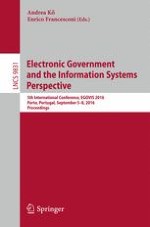This book constitutes the refereed proceedings of the 5th International Conference on Electronic Government and the Information Systems Perspective, EGOVIS 2016, held in Porto, Portugal, in September 2016, in conjunction with DEXA 2015.
The 22 revised full papers presented together with three invited talk were carefully reviewed and selected from 27 submissions. The papers are organized in the following topical sections: e-government cases - legal issues; e-government cases - technical issues; open data and transparency; knowledge representation and modeling in e-government; intelligent systems in e-government; e-government research and intelligent systems; e-government data and knowledge management; identity management in e-government.
